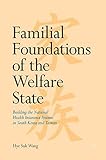Familial foundations of the welfare state : building the national health insurance systems in South Korea and Taiwan / Hye Suk Wang.
Material type: TextPublication details: Cham, Switzerland : Palgrave Macmillan, (c)2017.Description: 1 online resourceContent type:
TextPublication details: Cham, Switzerland : Palgrave Macmillan, (c)2017.Description: 1 online resourceContent type: - text
- computer
- online resource
- 9783319587127
- 3319587129
- JC479 .F365 2017
- COPYRIGHT NOT covered - Click this link to request copyright permission: https://lib.ciu.edu/copyright-request-form
| Item type | Current library | Collection | Call number | URL | Status | Date due | Barcode | |
|---|---|---|---|---|---|---|---|---|
 Online Book (LOGIN USING YOUR MY CIU LOGIN AND PASSWORD)
Online Book (LOGIN USING YOUR MY CIU LOGIN AND PASSWORD)
|
G. Allen Fleece Library ONLINE | Non-fiction | JC479 (Browse shelf(Opens below)) | Link to resource | Available | on1003492435 |
Browsing G. Allen Fleece Library shelves, Shelving location: ONLINE, Collection: Non-fiction Close shelf browser (Hides shelf browser)
Includes bibliographies and index.
1. Introduction -- 2. Welfare Politics: Building Welfare Institutions -- 3. (De- ) Familialization in Social Policy in East Asia -- 4. Historical Development of NHI in S. Korea: Why not Equal Protection for Female Workers' Families? -- 5. Historical Development of NHI in Taiwan: De-familialization Path of Welfare Politics -- 6. Conclusion.
This book situates culture as a determining factor in the development of diverse welfare states, exploring the impact of traditional familialism on South Korean and Taiwanese programs. This approach provides an important alternative to studies that focus on formal variables- such as industrialization, state intervention, and resource mobilization- that do not explain the key differences between the similar programs. Throughout this book, Wang looks into both the historical development and the present situation of medical welfare programs in South Korea and Taiwan, and she highlights the importance of families in these programs' development. As East Asian societies continue to age while experiencing fewer births, the search for the most suitable, sustainable, and desirable welfare model in each country will become ever more pressing. Academics and practitioners alike will find this refreshing approach to analysis ideal for building welfare institutions that reflect societal values in addition to economic conditions.
COPYRIGHT NOT covered - Click this link to request copyright permission:
There are no comments on this title.







